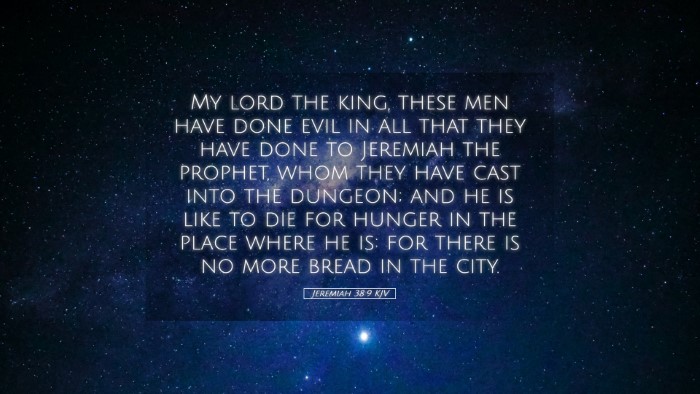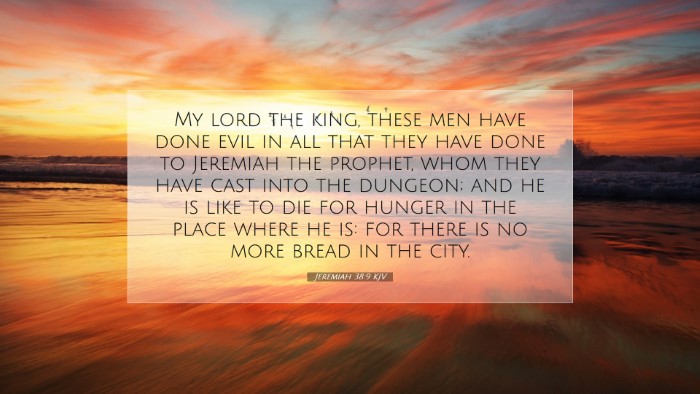Commentary on Jeremiah 38:9
Verse (Jeremiah 38:9): "My lord the king, these men have done evil in all that they have done to Jeremiah the prophet, whom they have cast into the dungeon; and he is likely to die from hunger in the place where he is, for there is no more bread in the city."
Insights from Public Domain Commentaries
Historical Context
Jeremiah 38 occurs against the backdrop of Jerusalem's siege by the Babylonians. The city faces imminent capture, and the conditions are dire. Within this context, the treatment of Jeremiah is particularly grievous, as he has been speaking God’s truth amidst widespread disbelief and rebellion.
The Nature of Injustice
As Matthew Henry notes, Jeremiah’s imprisonment in the cistern symbolizes the rejection of God's message. This act of silencing a prophet reflects the broader societal inclination to stifle divine truth when it challenges human desires. Henry emphasizes the moral corruption of the leaders who prefer to uphold their power rather than heed God's warnings.
The Role of Ebed-Melech
Adam Clarke makes a pertinent observation regarding Ebed-Melech, the Ethiopian eunuch who advocates for Jeremiah's release. Clarke points out that Ebed-Melech’s intervention exemplifies the heart of a genuine servant of God. He risks his position and reputation to save God's messenger, representing the remnant of faithful individuals who stand for righteousness even in troubling times.
The Desperation of the Prophets
When Jeremiah is lowered into the dungeon, there was no way for him to easily escape. Albert Barnes emphasizes this physical entrapment mirrors the spiritual state of Jerusalem. The city is caught in a cycle of sin and willful ignorance, with Jeremiah's prophetic voice being drown out by the cries of fear and defiance. Barnes remarks on how the plight of the prophet serves as a cautionary tale against ignoring God’s word.
The Consequences of Rejection
The desperate plea of Ebed-Melech sheds light on the crucial theme of consequences for rejecting God's message. Jeremiah's situation is dire and serves as an indictment against the leaders who, in their pursuit of power, have rendered God’s messenger powerless. Henry notes that the lack of bread points not only to physical sustenance but also to a spiritual famine resulting from the people's disobedience.
Spiritual and Physical Hunger
Barnes remarks on the duality of hunger in this verse. While there is a literal hunger due to the siege, there is also a profound spiritual hunger resulting from the absence of true guidance and wisdom. Jerusalem had forsaken the ways of God, and thus, the true nourishment of the soul was absent. This dichotomy reflects the reality that neglecting spiritual truths can lead to the empty promises of the world.
The Incarnational Aspect of Prophecy
Clarke draws a parallel between Jeremiah’s plight and the suffering of Christ. Just as Jeremiah faced rejection and despair, so too did Jesus suffer at the hands of those who despised the truth. This comparison aids in understanding the deeper layers of prophetic ministry, where spiritual leaders often bear the burdens of their people's iniquities.
Theological Implications
The events in Jeremiah 38:9 challenge readers to reflect on the nature of power within spiritual leadership. Should authorities in church and society be more concerned about maintaining control or about heeding divine counsel? It prompts a reevaluation of priorities among pastors and leaders: Are they advocating for justice and mercy as Ebed-Melech did, or are they complicit in the oppression of truth as the others were?
Application for Believers
For contemporary believers, the events surrounding Jeremiah's imprisonment serve as a call to stand firm in faith amid adversity. Like Ebed-Melech, there is a calling to defend the innocent and speak out against injustices. The church is to be a bastion of truth, meeting both the physical and spiritual needs of society.
- Stand Against Injustice: Believers are called to be advocates for those who are oppressed and marginalized.
- Uphold Truth: In a world filled with misinformation and spiritual apathy, Christians must cherish and proclaim the truth of Scripture.
- Practice Compassion: Just as Ebed-Melech showed care for Jeremiah’s plight, Christians are to demonstrate compassion and empathy towards others.
- Encourage Faithfulness: Strengthening each other in faith during crises is essential for the body of Christ.
Conclusion
Jeremiah 38:9 serves as a poignant reminder of the cost of faithful obedience to God. Through the lens of this narrative, scholars, pastors, and students of the Word are compelled to examine their own responses to God's calling in the face of adversity. Drawing from the wisdom of early commentators like Henry, Clarke, and Barnes, it is evident that the themes of injustice, courage, and spiritual hunger resonate deeply in both historical and contemporary contexts. May this serve as a clarion call to champion God’s truth and to act as His instruments of justice and mercy in an often tumultuous world.


